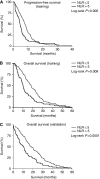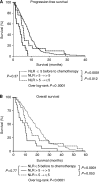Neutrophil/lymphocyte ratio predicts chemotherapy outcomes in patients with advanced colorectal cancer
- PMID: 21448173
- PMCID: PMC3078587
- DOI: 10.1038/bjc.2011.100
Neutrophil/lymphocyte ratio predicts chemotherapy outcomes in patients with advanced colorectal cancer
Abstract
Background: Advances in the treatment of metastatic colorectal cancer (mCRC) in the last decade have significantly improved survival; however, simple biomarkers to predict response or toxicity have not been identified, which are applicable to all community oncology settings worldwide. The use of inflammatory markers based on differential white-cell counts, such as the neutrophil/lymphocyte ratio (NLR), may be simple and readily available biomarkers.
Methods: Clinical information and baseline laboratory parameters were available for 349 patients, from two independent cohorts, with unresectable mCRC receiving first-line palliative chemotherapy. Associations between baseline prognostic variables, including inflammatory markers such as the NLR and tumour response, progression and survival were investigated.
Results: In the training cohort, combination-agent chemotherapy (P=0.001) and NLR ≤ 5 (P=0.003) were associated with improved clinical benefit. The ECOG performance status 1 (P=0.002), NLR>5 (P=0.01), hypoalbuminaemia (P=0.03) and single-agent chemotherapy (P<0.0001) were associated with increased risk of progression. The ECOG performance status ≥ 1 (P=0.004) and NLR>5 (P=0.002) predicted worse overall survival (OS). The NLR was confirmed to independently predict OS in the validation cohort (P<0.0001). Normalisation of the NLR after one cycle of chemotherapy in a subset of patients resulted in improved progression-free survival (P=0.012).
Conclusion: These results have highlighted NLR as a potentially useful clinical biomarker of systemic inflammatory response in predicting clinically meaningful outcomes in two independent cohorts. Results of this study have also confirmed the importance of a chronic systemic inflammatory response influencing clinical outcomes in patients with mCRC.
Conflict of interest statement
The authors declare no conflict of interest.
Figures



References
-
- Arieta O, Michel Ortega RM, Villaneuva-Rodriguez G, Serna-Thome MG, Flores-Estrada D, Diaz-Romero C, Rodriguez CM, Martinez L, Sanchez-Lara K (2010) Association of nutritional status and serum albumin levels with development of toxicity in patients with advanced non-small cell lung cancer treated with paclitaxel-cisplatin chemotherapy: a prospective study. BMC Cancer 10: 50. - PMC - PubMed
-
- Balkwill F, Mantovani A (2010) Cancer and inflammation: implications for pharmacology and therapeutics. Clin Pharmacol Ther 87: 401–406 - PubMed
-
- Bokemeyer C, Bondarenko I, Makhson A, Hartmann JT, Aparicio J, de Braud F, Donea S, Ludwig H, Schuch G, Stroh C, Loos AH, Zubel A, Koralewski P (2009) Fluorouracil, leucovorin, and oxaliplatin with and without cetuximab in the first-line treatment of metastatic colorectal cancer. J Clin Oncol 27: 663–671 - PubMed
-
- Chua W, Kho PS, Moore MM, Charles KA, Clarke SJ (2010) Clinical, laboratory and molecular factors predicting chemotherapy efficacy and toxicity in colorectal cancer. Crit Rev Oncol Hematol [E-pub ahead of print 16 August 2010; doi:10.101.6/j.critrevonc.2010.07.012] - PubMed
Publication types
MeSH terms
Grants and funding
LinkOut - more resources
Full Text Sources
Other Literature Sources
Medical

